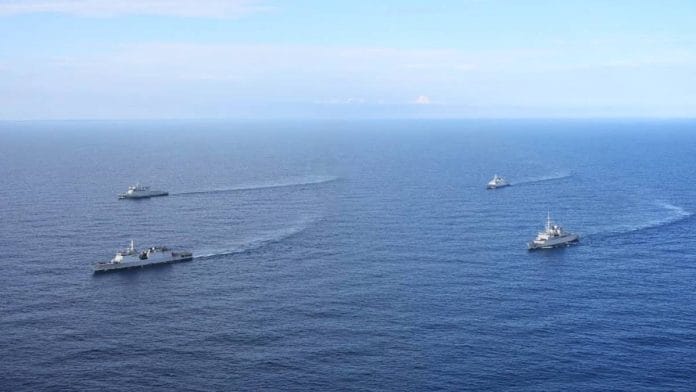New Delhi: The US Monday imposed sanctions on more than 30 tanker operators, brokers and shipping companies for their alleged role in selling and transporting Iranian petroleum. This includes four Indian companies as well.
The move is part of efforts to cut Iran’s crude exports to zero and prevent the country from advancing its nuclear programme.
According to the US Treasury Department, Iran’s state-run oil company, NIOC, plays a key role in funding Iran’s military and proxy groups, including the Islamic Revolutionary Guard Corps-Qods Force (IRGC-QF). Each year, Iran directs billions of dollars in oil revenue to its armed forces.
Despite numerous sanctions imposed by the US, Tehran’s oil exports generated an estimated $54 billion in revenue in 2022 and $53 billion in 2023. In 2024, Iran’s oil production hit its highest level since 2018, according to Organisation of Petroleum Exporting Countries (OPEC) data.
Iran is said to have been able to bypass sanctions and increase oil exports mainly through a ‘shadow fleet’—a network of tankers, brokers and shippers that allegedly operate under false identities and deceptive tactics.
“Iran continues to rely on a shadowy network of vessels, shippers and brokers to facilitate its oil sales and fund its destabilising activities,” said US Treasury Secretary Scott Bessent in a statement.
Also Read: Indian shipping sector is vulnerable to geopolitical unrest. Build local, invest in air cargo
Shadow fleet
A shadow fleet is a ship or vessel that uses concealing tactics to smuggle sanctioned goods through the use of unregistered or fraudulent vessels.
A way to counter international or unilateral economic sanctions, these fleets operate in a legal grey area, making it difficult to track and stop their activities.
Countries are believed to use different tactics to conceal their shadow fleet, such as disabling the automatic identification system to hide vessel movements and manipulating global navigation satellite system data to distort vessel location. They also switch a ship’s registered country (flag-hopping) to dodge sanctions and regulations and use complicated or unclear ownership arrangements to hide the origin of ships.
According to vessel trackers at US-based non-profit advocacy United Against Nuclear Iran (UANI), Iran boosted its oil exports in 2022 using nearly 300 “dark fleet” tankers—ships that operate secretly to avoid sanctions. China was by far the biggest buyer, purchasing over 70 percent of 430 million barrels of Iranian crude, followed by Syria and Venezuela.
As stated by the US Treasury Department, Iran relies upon a sprawling network of tankers and ship management firms in multiple jurisdictions to transport its petroleum to overseas customers, using tactics such as false documentation, manipulation of vessel tracking systems, and constant changes to the names and flags of vessels.
Flag-hopping
Flag-hopping is the practice of changing a ship’s registered country frequently to conceal ownership and avoid detection, especially in sanctions-related shipping. While changing a ship’s registration is a legal financial practice, it is often misused to mask illicit activities.
Iranian ships frequently switch flags between Panama, Liberia and Tanzania, making it harder to trace their true origin. One striking example is the case of the tanker Remy, which was operating under two identities, a Reuters report stated.
In February 2023, Remy was officially headed to Malaysia, appearing as a Panama-flagged ship carrying 1 million barrels of oil from Iraq, according to a document in its captain’s possession. However, in reality, Remy was part of a large oil smuggling network. It was also going by another name, Deep Ocean, and was secretly transporting Iranian crude not Iraqi oil, Reuters reported.
The captain had two certificates of origin—one from Iraq’s Basrah oil terminal and one from National Iranian Oil Company, both having the same date. In reality, Remy had taken Iranian oil from another ship, the Iran-flagged Sonia 1, which belonged to Iranian company Sahara Thunder. This secret transfer was caught on satellite by the European Space Agency’s Sentinel-2, according to Reuters.
Ship-to-ship transfers
Iran has frequently relied on ship-to-ship transfers to move oil and oil products outside jurisdictional port limits, using non-sanctioned vessels to disguise the oil’s Iranian origin, the US Treasury Department stated.
In June 2019, Iranian cargo ship Hayan departed from Bandar Abbas, heading toward Karachi, Pakistan, as tracked by maritime risk analyst Windward.
On June 7, while still en route, it is alleged to have changed its name to Mehri II and switched its flag to Samoa. Six days later, the ship transferred its unknown cargo to another vessel off Pakistan’s coast. After completing the transfer, the ship returned to Iran, switching its flag back to Iran and its name back to Hayan.
According to an article by United States Institute of Peace, UAE-based Galileos Marine Services manages the vessel Jaya, which has since at least 2022 been actively transporting Iranian crude oil while repeatedly changing its name and flag to avoid detection and accountability.
Varnika Dhawan is an intern with ThePrint.
(Edited by Nida Fatima Siddiqui)
Also Read: Shipping containers, made in India — how Modi govt aims to cut dependence on China ‘monopoly’






